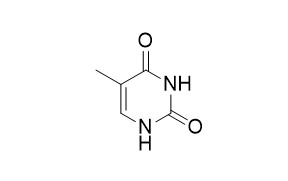Thymine
Thymine DNA glycosylase is essential for active DNA demethylation by linked deamination-base excision repair.
Inquire / Order:
manager@chemfaces.com
Technical Inquiries:
service@chemfaces.com
Tel:
+86-27-84237783
Fax:
+86-27-84254680
Address:
1 Building, No. 83, CheCheng Rd., Wuhan Economic and Technological Development Zone, Wuhan, Hubei 430056, PRC
Providing storage is as stated on the product vial and the vial is kept tightly sealed, the product can be stored for up to
24 months(2-8C).
Wherever possible, you should prepare and use solutions on the same day. However, if you need to make up stock solutions in advance, we recommend that you store the solution as aliquots in tightly sealed vials at -20C. Generally, these will be useable for up to two weeks. Before use, and prior to opening the vial we recommend that you allow your product to equilibrate to room temperature for at least 1 hour.
Need more advice on solubility, usage and handling? Please email to: service@chemfaces.com
The packaging of the product may have turned upside down during transportation, resulting in the natural compounds adhering to the neck or cap of the vial. take the vial out of its packaging and gently shake to let the compounds fall to the bottom of the vial. for liquid products, centrifuge at 200-500 RPM to gather the liquid at the bottom of the vial. try to avoid loss or contamination during handling.
PLoS One.2018, 13(4):e0195642
Molecules.2019, 24(6):E1177
Toxicol In Vitro.2022, 81:105346.
Molecules.2021, 26(9):2802.
Sci Rep.2015, 5:13194
Journal of Applied Pharmaceutical Science2022, 0(00), pp:001-007
Cells.2021, 10(10):2633.
Research on Crops.2017, 18(2)
Phytomedicine.2024, 155760.
Phytomedicine.2023, 120:155063.
Related and Featured Products
Biochemistry, 1989, 28(20):7979-84.
A new mechanism for repairing oxidative damage to DNA: (A)BC excinuclease removes AP sites and thymine glycols from DNA.[Reference:
WebLink]
Escherichia coli (A)BC excinuclease is the major enzyme responsible for removing bulky adducts, such as pyrimidine dimers and 6-4 photoproducts, from DNA. Mutants deficient in this enzyme are extremely sensitive to UV and UV-mimetic agents, but not to oxidizing agents, or ionizing radiation which damages DNA in part by generating active oxygen species. DNA glycosylases and AP1 endonucleases play major roles in repairing oxidative DNA damage, and thus it has been assumed that nucleotide excision repair has no role in cellular defense against damage by ionizing radiation and oxidative damage.
METHODS AND RESULTS:
In this study we show that the E. coli nucleotide excision repair enzyme (A)BC excinuclease removes from DNA the two major products of oxidative damage, Thymine glycol and the baseless sugar (AP site).
CONCLUSIONS:
We conclude that nucleotide excision repair is an important cellular defense mechanism against oxidizing agents.
Proceedings of the National Academy of Sciences of the United States of America, 01 Aug 1989, 86(16):6196-6200
Dynamics of mitochondrial DNA evolution in animals: amplification and sequencing with conserved primers.[Reference:
WebLink]
METHODS AND RESULTS:
With a standard set of primers directed toward conserved regions, we have used the polymerase chain reaction to amplify homologous segments of mtDNA from more than 100 animal species, including mammals, birds, amphibians, fishes, and some invertebrates. Amplification and direct sequencing were possible using unpurified mtDNA from nanogram samples of fresh specimens and microgram amounts of tissues preserved for months in alcohol or decades in the dry state. The bird and fish sequences evolve with the same strong bias toward transitions that holds for mammals. However, because the light strand of birds is deficient in Thymine, Thymine to cytosine transitions are less common than in other taxa. Amino acid replacement in a segment of the cytochrome b gene is faster in mammals and birds than in fishes and the pattern of replacements fits the structural hypothesis for cytochrome b.
CONCLUSIONS:
The unexpectedly wide taxonomic utility of these primers offers opportunities for phylogenetic and population research.



